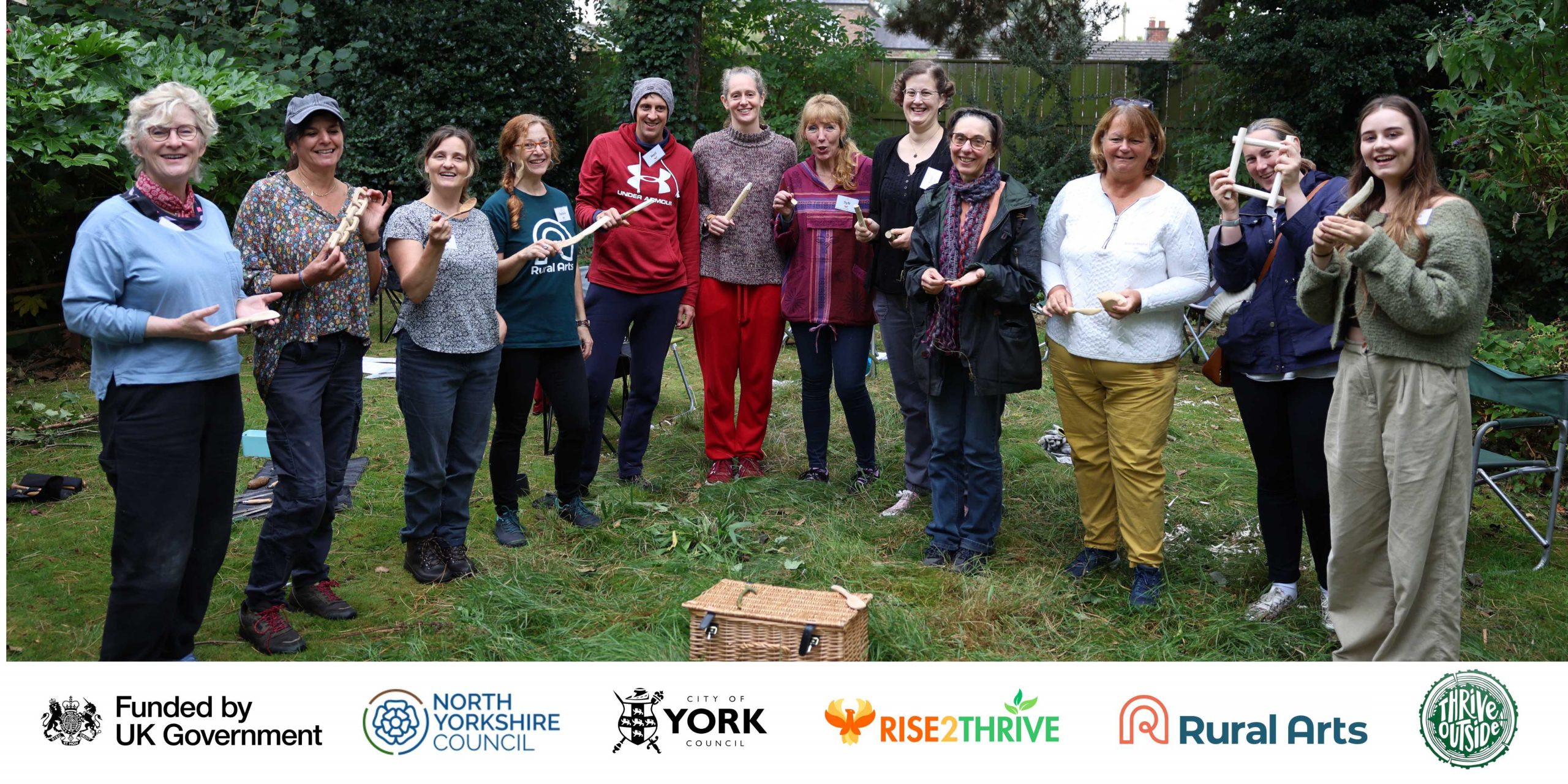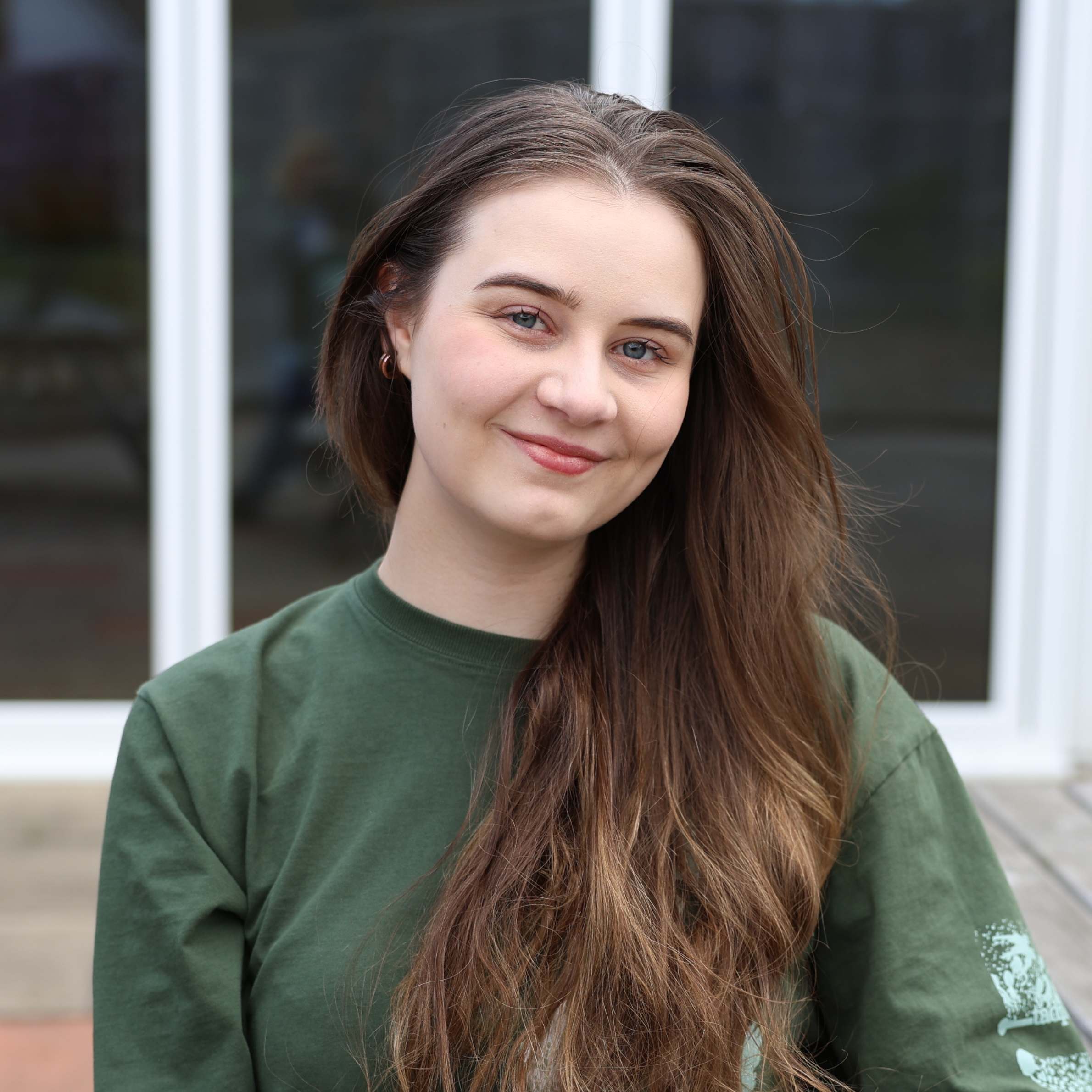Partnerships in Action – Rural Arts & Thrive Outside

In September, our team spent an inspiring morning capturing some of the support taking place on the Rise2Thrive [R2T] programme with two of our delivery partners, Thirsk based charity Rural Arts, and York based Thrive Outside – a nature-based CIC combining their love of green spaces with outdoor crafts.
Part of an ongoing collaboration between our partners, Rural Arts had organised for their Rise2Thrive participants to attend a third wellbeing intervention with Thrive Outside’s expert crafters Melanie and Claire – the intervention forming part of our broader partnership approach to supporting participant wellbeing.
Following an initial tour of Rural Arts’s inviting space at The Courthouse in Thirsk, we chatted briefly with several participants staying on in the studio for the day, before heading down to Holy Rood House’s grounds for a morning of heritage craft, whittling and twine making. There, we found a circle of participants in a private nook between trees, the group immersed in their crafts – some members carving branches from their last session, while others crafted twine from nettles.

[From right to left – The Court House, Rural Art’s pottery studio, autumn activity timetable]
Chatting to the participants about their experience of Thrive Outside’s workshops, it’s clear there’s been a positive impact. Participants have learnt a range of skills, formed new connections, and deepened their appreciation of the outdoors – all things which Melanie and Claire deliberately embed within workshops with a view of improving participant wellbeing:
“It’s boosted my confidence. You’re trying something new and you’re getting out and talking to people”
“You start off thinking I can’t do it, I can’t do it, and then you find that you can do it, which builds your confidence and wellbeing.”
Confidence is something that’s grown steadily for the group over the course of the sessions with trying new skills, and new creative mediums. For several participants, engaging in these workshops is something they “never would’ve even considered” prior to joining the programme, but is something they’re now actively implementing in their day-to-day lives. Many of the group have since bought the tools to carry on the practice in their own homes, while others have brought old tools out of retirement in honour of their newfound passions:
“I had this knife that had been hidden away for years, and when I came here, I dug it out again. I took one of the hazel branches home, and then continued to whittle at home.’’

“Learning new skills” (or rediscovering old ones) appears to be the highlight of the intervention amongst attendants, but aside from this, it’s the “interaction with nature” which has been so key to improving their wellbeing: “it’s a way to slow down”, “it’s fun and meditative”, “being outside is really nice”, “it stops you thinking about stuff.”
By way of their joint sessions, Rural Arts and Thrive Outside have cultivated a space where participants can come together and feel safe. Safe enough to forget their stressors – or to feel them, in a group without judgement:
“It’s somewhere where it’s okay not to be okay. You know that everyone is here [on R2T] because they’re struggling with something. You feel like you can be a bit more open.”
“You get a different perspective here than you get at the job centre”.
It’s easy to forget day-to-day worries when working with something tactile – like wood or nettles, but particularly when you’re surrounded by nature. In this case, several dozen chickens, a goat, and a host of tiny amphibians we found darting between the group’s mounting wood chippings.

For participants at Rural Arts, access to these collaborative workshops and green spaces has had a profoundly positive impact on their wellbeing, and are just as key as traditional employability support in allowing them the opportunity to overcome their barriers to education, employment, and wellbeing.
The feedback from the 17 individuals who’ve accessed Thrive Outside’s intervention through Rural Arts has been overwhelmingly positive, with all participants reporting marked improvements in a range of areas. 17 of 17 agreed that they were mentally healthier as a result of the intervention and their skills had improved, whilst 15 felt their social networks had strengthened & 9 reported feeling more prepared for employment.
These outcomes demonstrate the powerful role that creative, nature-based interventions can play not only in improving wellbeing, but in readying people for employment and/or education in a way they can sustain.
Wellbeing focused interventions form part of our holistic approach to delivery, a model which integrates employability support with interventions like this one, which are designed to tackle a range of participant barriers relating to skills gaps, finances, housing difficulties, & mental and physical wellbeing.
- If you’d like to learn more about the programme, contact the Rise2Thrive team @ rise2thrive@betterconnect.org.uk
- Have a story you’d like to share from one of our programmes? Contact our Impact Coordinator @ lsandiford@betterconnect.org.uk

Post by Laura Sandiford
Impact Manager
A keen storyteller & collaborator, Laura works as the Impact Manager together with our Head of Impact, Hannah, where she measures and highlights the impact of Better Connect across the business, programmes and partnerships.
She does so by working with a range of partners, participants and externals to gather information and stories, which she then translates into a range of engaging content across Better Connect’s channels. Ensuring the ‘Better Connect’ story is woven throughout all communications is a large part of Laura’s role, as is demonstrating the ripple effect across our programmes, partnerships, and sector-advocacy.
Laura’s favourite part of the role is connecting with the faces behind the case studies and giving voice to their experiences.
Learn more about Laura